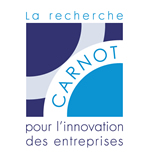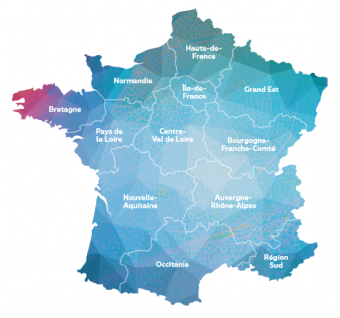Hauts-de-France
Examples of partnerships with companies in the region
Malengé Packaging produces flexible packaging that meets the recyclability requirements that now apply in the agri-food industry
Partnership Carnot Institute PolyNat - Malengé PackagingDry foods can now be protected from light, oxygen and humidity by a really light and totally recyclable paper container made from virgin fibres, developed in partnership with CTP (Carnot PolyNat).
Malengé Packaging produces flexible packaging that meets the recyclability requirements that now apply in the agri-food industry
Dry foods can now be protected from light, oxygen and humidity by a really light and totally recyclable paper container made from virgin fibres, developed in partnership with CTP (Carnot PolyNat).
Supporting Innovation
Packaging has been identified as a major cause of pollution due to the difficulties inherent in sorting and recycling a complex product made from materials with very different life cycles. Under French EPR regulations, producers must design their packaging in a way that reduces its impact on the environment once it is processed as waste. Malengé Packaging’s commercial offering is made from a mono-material paper base with barrier properties conferred by functional printing processes. Optimal sealing and surface treatment properties reduce its weight by between 15% to 40% of equivalent-type packaging with a plastic or aluminium layer. The result is a container that is compatible with the paper recycling chain while affording excellent protection to products. Overall, the carbon footprint can be up to 60% smaller than existing solutions on the market.
The client needs
Malengé Packaging is a one hundred-year-old company based in the Hauts de France region of Northern France and specialising in offset printing. Since 2000, it has been harnessing its expertise to the emerging flexible packaging market, where it has become a reference, particularly for organic products, coffee and seeds. The company has invested in the search for a solution that would enable manufacturers to comply with their environmental commitments in terms of packaging. Malengé wishes to develop a flexible packaging offering that uses processes and materials from the paper industry. It is based on 100% recyclable barrier paper whose components must all be optimized to meet the imperatives of cutting down on both materials and weight. It was as part of a joint research lab (ANR-LAB3P), bringing together Malengé Packaging and the Pulp and Paper Research and Technical Centre (CTP), that these two long-standing partners made this project a reality by developing the Cycle Pack range, based around a material recognised as being recyclable by CEREC (French committee for evaluating the recyclability of paper-cardboard packaging). ANR-LAB3P was set up in 2016 and by 2018 it had already come up with a commercial product that met the requirements of a first customer. Cycle Pack is fully adapted to collection and recycling channels and it earned Malengé the Grand Prix Innovation prize at the Citeo Circular Challenge.
Partnership
PolyNat Carnot Institute seeks to create new bio-based materials and functional systems. As part of this research, CTP explores all of the innovation possibilities linked to the sustainable use of paper resources. It focuses on replacing multi-material solutions that use aluminium and polyethylene and are responsible for a major portion of materials wasted. CTP’s contribution was decisive for selecting ecological barrier components and for using functional printing, which provides the barrier properties by depositing optimal quantities only in the areas concerned. Its expertise in this domain initially made it possible to come up with a light, printable and heat-sealable paper, compatible with standard machines, and 100% recyclable. It was first used to store a powder flan, thoroughly insulated from light, water vapour and grease. The partnership is continuing apace and all of Malengé's teams are on board. The company will be able to expand its product range and the range of barrier properties it can offer its customers. Thanks to increasing demand, Malengé is already adding production capacity and expanding its workforce.
A pipe-crawling drone helps anticipate and rationalise dredging operations.
Partnership CEA LIST Carnot Institute - Veolia SARPThanks to its partnership with a Carnot Institute, SARP, a subsidiary of French group Veolia Environment, is able to offer a faster and economical assessment to local communities with its new drone "PREDIRE".
A pipe-crawling drone helps anticipate and rationalise dredging operations.
Supporting Innovation
The use of video to inspect sewer pipes for maintenance work has been in use for quite a while. But such a solution quickly reaches its limits in the case of a partially clogged drain. With PREDIRE, the exploratory analysis can be carried out whatever the environment. Indeed, the fully autonomous unmanned vehicle can move across a broad variety of terrains (grease, mud, sand) by means of a worm screw propulsion system and climbs up and down obstacles very easily.
The wireless and pilotless explorer can travel distances up to 1.2 km per day. The robot is able to take high-definition photos every 10 seconds, thus providing the teams with the necessary data to estimate what is actually needed in terms of dredging operations or in relation with the sections to be treated.
This most effective preventive economical maintenance process therefore allows to save on very costly operations.
The client needs
SARP, a subsidiary of French group Veolia Environment, results from mostly the aggregation of several, sometimes 100-generation old, family-run businesses.
The 150 agencies making the group provide sewer maintenance for the municipalities and local communities.
Dredging clean-up operations require heavy equipment fitted with high-pressure pumps. The company has asked to limit this type of maintenance operation to a strict minimum by way of preventive inspections since 2014. To this end, SARP made field requirements to the CEA LIST Carnot Institute.
Now four years later, PREDIRE is able to move across pipes up to 20-30 cm diameter, ie accross 70% of the sewer network. The data thus collected has enabled SARP to significantly improve its knowledge and learn about the sewing pipes by implementing a reliable predictive maintenance strategy. SARP is able to provide its 100 000 customers, as a result, with a very innovative and competitive cost-constrained service offering, including both a drone pre-diagnosis and dredge optimisation.
Partnership
The CEA LIST Carnot Institute is a tech institute dedicated to smart digital systems. In response to SARP’s needs, without any technological a-priori, the teams collaborated iteratively by applying the so-called Archimedes screw or worm screw for the propulsion system. Linked to a dedicated control system the drone scans and refines its approach, as it moves through the detected environment.
Two patents protect this innovation, moved to a state of industrialisation at the end of 2018.
The Carnot researchers have worked from an expression of requirements. They have managed to apprehend all issues and constraints and conceive a built-in system through a collaborative R&D interactive partnership. The robust PREDIRE inspection system is already being operated by SARP and has been introduced on newly gained markets. Used internally for now, the device could well be marketed widely in the near future.
As children’s feet stretch, Decathlon and Carnot ARTS Institute rethink the way shoes are designed
Partnership ARTS Carnot Institute - DecathlonThe strong technical collaboration has helped reduce the risk of injury among junior tennis players without altering performances.
As children’s feet stretch, Decathlon and Carnot ARTS Institute rethink the way shoes are designed
Supporting Innovation
For 40 years, Decathlon R&D teams have been challenging many of the pre-conceived notions to create high-value products, whose guarantee of exclusiveness paves the way to their commercial success.
Based on the observations of its SportsLab, Decathlon innovates with a new type of ‘tennis shoe’ for kids.
Contrary to the competition’s custom, which considers kid’s shoes as mini adult shoes, Decathlon was, as a result, able to design a tennis shoe best suited to the kid’s feet development.
In partnership with LAMIH*, one of Carnot ARTS Institute’s lab, and the ISM**, a component of the STAR Carnot Institute, Decathlon has monitored 30 junior tennis players over an entire playing season.
The ideal footwear design could be established based on the behaviour, on the one hand, of the players fitted with the new shoes, and on the other hand, on the ground impact characteristics of the shoes during the play more particularly.
* France-based Laboratory of Industrial and Human Automation control, Mechanical engineering and Computer Science (Laboratoire d'Automatique, Mécanique, Informatique, industrielles et Humaines)
** Institute of Human Movement Sciences, (Institut des Sciences du Mouvement) based at Aix-Marseille University (AMU)
The client needs
Decathlon has been built on its capacity to set itself apart from the competition trough innovation. Its ambition is to allow the greatest number of players to pursue sport and physical activities in optimal safety conditions.
Decathlon R&D teams complement their studies built around high-level scientific inflows from external laboratories through parternships.
On the basis of a CIFRE*** doctoral thesis, Decathlon has thus been able to study and model individual gestures and multiply modelling to their prototyping.
Measurements on the young players make it possible to validate physiological constraints and maximise convenience for users, without affecting their performances.
Such technological advance is crucial for Decathlon, which targets a market with high growth potential despite stiff competition, and reinforces its position as the preferred company for French customers ahead of Amazon.
In France, tennis is the most important individual sport with more than 524,000 regular licensed players aged 18 or younger****.
***CIFRE = Industrial Agreement of Training through Research (Doctoral fellowships program)
**** Source FFT http://www.fft.fr/fft/missions/quelques-chiffres
Partnership
LAMIH aims at studying the relationship between humans and systems.
Fostering interactions and agents, laboratory of the ARTS Carnot Institute is also able to analyse, model and simulate human movements.
LAMIH has provided Decathlon a recognized expertise in data-processing and analysis of movement kinematics and dynamics.
Physiological readings have not been averaged using common practice. All specific cases, on the contrary, were examined to extend the statistical data subjects.
Installed at Valenciennes university’s campus, geographically close to Decathlon SportsLab’s teams, LAMIH has provided its foremost resources with a view to supporting the group’s strategy for innovation.
With 80,000 employees in 2017, Decathlon operates globally and saw an 11% increase in sales.
Photo - Source Decathlon SportsLab
Regions
Bourgogne-Franche-Comté
Bretagne
Centre-Val de Loire
Grand Est
Hauts-de-France
Île-de-France
Normandie
Nouvelle-Aquitaine
Occitanie
Pays de la Loire
Région Sud


